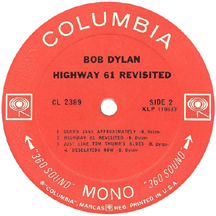“Desolation Row” is a 1965 song written and sung by Bob Dylan. It was recorded on August 4, 1965 and released as the closing track of Dylan’s sixth studio album, Highway 61 Revisited. It has been noted for its length (11:21) and surreal lyrics in which Dylan weaves characters from history, fiction, the Bible, and his own invention into a series of vignettes that suggest entropy and urban chaos. (More from Wikipedia)
In like manner, I don’t view the release of Another Side of Bob Dylan as a radical break from the past, but rather a natural evolution of his music. For that matter, I feel the same way about Bob Dylan’s “going electric” on his next two albums, Bringing it All Back Home and Highway 61 Revisited; and also his Christian period in the trilogy of albums from 1979-1981: Slow Train Coming, Saved, and Shot of Love. Bob Dylan is very much undervalued as an instrumentalist, in my judgment; his guitar playing – and his harmonica, and his work as a pianist – is so strong that I often don’t even notice whether a song is acoustic or electric. As an example, until I saw it pointed out in Wikipedia while I was researching this month’s post, I had not realized that one of my Top Ten favorite Bob Dylan songs – the last and longest track on Highway 61 Revisited, “Desolation Row” – was the only non-electric song on the album.
(May 2013)
* * *
Along with many other figures from the underground press, Mick Farren moved to the influential New Musical Express (NME) in 1974. Quoting again from the Telegraph obituary: “Allowed free rein to explore the outer reaches of popular culture by its editor, Nick Logan, Farren turned in a series of memorable pieces on people such as the motorbike stunt-rider Evel Knievel and the avant-garde film director Kenneth Anger.
“In the summer of 1976, by which time the Sex Pistols were introducing Britain to punk, Farren’s NME piece headlined ‘The Titanic Sails At Dawn’ [again using a Bob Dylan lyric, this time from one of my all-time favorites, “Desolation Row”] was judged to have caught the mood among the generation of teenagers disaffected by giant stadium acts like the Rolling Stones and Led Zeppelin.”
(March 2014/1)















